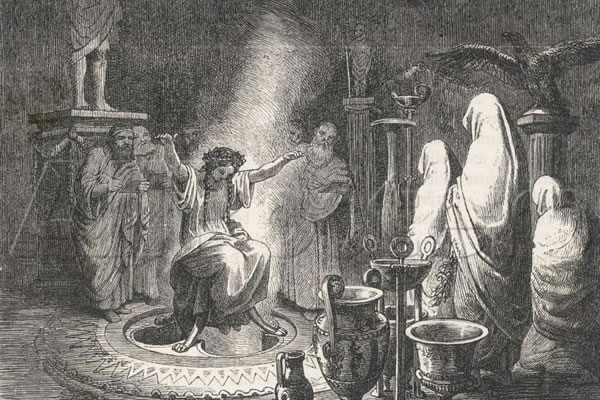Was the Ancient Greece Oracle of Delphi Really Clairvoyant ?

Kings or peasants, Greeks or Orientals, the men of Antiquity went to the Temple of Apollo in Delphi to learn, through the voice of the Pythia, what fate had in store for them. Her influence is such that wars are decided on the advice of the oracle; empires would have collapsed for not having listened to her.
A legendary construction
In the Iliad, Homer tells us about the foundation of the temple. In times of darkness, the site is home to an oracle dedicated to the ancient deity of the earth, Gaia. It is guarded by the terrible dragon Typhon. To make the place his own, Apollo slays Typhon in an epic battle. The monster's corpse, rotting on the spot, leaves its name to the place, Pytho meaning "I rot". Apollo then transforms into a dolphin (Delphi) and hijacks a Cretan ship: the crew trains the temple's first servants, and the god promises to come every year to advise the humans. His temple is located at the center of the universe, it symbolizes the navel of the world, marked by a stone called Omphalos. Zeus, anxious to verify the fact, one day releases two eagles, one on each edge of the earth: they cross over the stone.
Far from the myth, history teaches us that the first temple of Delphi dates from the end of the 2nd millennium BC. Clinging to the south face of Mount Parnassus, framed by the pink cliff of Rhodini and the blazing cliff of Phlemboucos between which springs the sacred source of Castalia, it dominates a plain covered with olive trees, domain of Apollo, that it is forbidden to cultivate. Pilgrims arrive there either by sea, disembarking at the small port of Kirrha, or by land, crossing the Arachova pass. From the 6th century BC, the city of Delphi appears not far from the temple, drawing its resources from the passage of pilgrims. In 548, a fire devastated the temple: it was rebuilt, bigger and more beautiful, thanks to a Panhellenic subscription.
Several days of waiting
In the early days, the oracle visited once a year. Faced with growing success, the priests adopt a monthly rhythm and employ two, then three pythias. Despite everything, those who come to consult often wait several days before their turn arrives. These days are devoted to offerings, sacrifices and purifications. People sprinkle themselves at the source of Castalia, above which is still engraved today this sentence: "A drop is enough for the good pilgrim, as for the wicked, the ocean itself would not wash away its stain." The Oracle is expensive; the consultant must buy a very luxurious cake to offer on an altar opposite the sanctuary; then, on another altar, he sacrifices a sheep or a goat.
The trance of the pythia
The pythia is the intermediary between god and men. The first pythias are young virgins, reports the Greek historian Diodorus of Sicily, but the tradition is changed the day a consultant, carried away by his senses, rapes one of them. They are then replaced by women in their fifties, most often simple peasants from the region. They do not need to have any special gifts: they are only Apollo's instrument. On the day of the oracle, the pythia purifies herself with a ritual bath and dons a ceremonial costume. Then she will settle down deep within the sanctuary, on a golden tripod. There she breathes the sacred exhalation, and most likely hallucinogenic, which rises from a crack in the ground. She then goes into a trance, she becomes the voice of Apollo. She screams, moans, sings incomprehensible words that the priest (prophets) interprets to give an answer to the consultant.
A political and strategic issue
About the Oracle, ancient authors are divided. Plutarch, who was a priest at Delphi, leaves many pamphlets on cults and rites, in which he does not question tradition. Heraclitus and Plato also defend the oracle, but Aeschylus, Euripides and Thucydides are skeptical. Herodotus, meanwhile, asserts his belief in the oracle principle, but recognizes that Delphi is not inaccessible to corruption. Indeed, the Delphic Oracle, consulted by kings, has strong political influence and the powerful are aware of it. Sparta, in particular, repeatedly spread oracles unfavorable to its adversaries: Delphi thus appeared in the 6th century as the strategic stake of a psychological warfare between cities.
A sham?
For the Latin Cicero, on the other hand, there is no doubt: in Concerning Divination (De Divinatione), he denounces the Oracle of Delphi as a sham. The Roman world, in fact, and especially Christianity over the centuries destroyed the influence of the sanctuary. It was the very Christian Emperor Theodosius who had it closed in the year 390. Oribasius, sent in 362 during the short reign of Julian the Apostate to try to restore the temple, took in the last known oracle: "Go tell the king it collapsed, the superb edifice. Phoebus no longer even has a hut, no longer even a prophetic laurel, no longer a babbling fountain; even the talkative water is silent ... "









































































































































































































































































































































